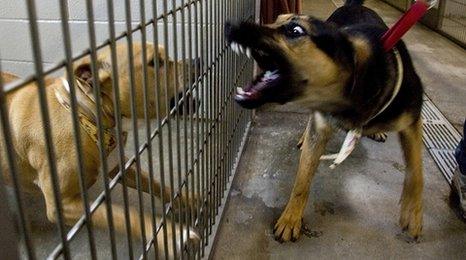Why Dubai matters to the world
- Published
When Dubai's highest profile company said it needed more time to pay back its debts the stock markets went into overdrive. So why does the financial stability of the city state affect the UK?
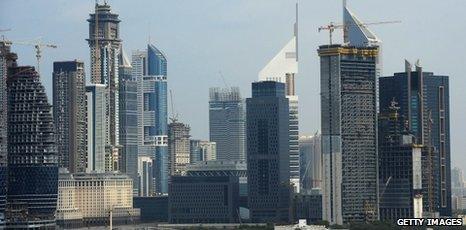
Jump off the plane and straight away you're hit by two things: heat and wealth.
The new airport in Dubai is just one of the huge construction projects that have helped transform a tiny kingdom the size of Kent into a strange mix of desert and futuristic metropolis.
Take a cab into the centre of the city and one building overshadows all others. Construction work on the Burj Dubai is now almost finished.
The world's tallest building is as high as 10 football pitches laid on top of each other.

If the financial crisis in Dubai spreads it could have an effect on the UK
Surrounded by desert, it towers above the clouds, dwarfing the other skyscrapers below it.
It is a symbol of how far and how fast Dubai has come over the last decade. But for the first time now there are serious questions being asked about the financial health of this city state.
For years it was thought Middle Eastern oil money would protect Dubai from the credit crunch and global recession that followed.
But last week one of the state's biggest companies, controlled by the government, suddenly asked for more time to pay back some of the cash it has borrowed from banks around the world.
Now those global investors are asking if all the billions of dollars, euros and pounds they have poured into this city really were a wise bet.
Today's global economy means financial problems in Dubai, thousands of miles away, can quickly make waves back home in the UK.
The credit crunch
Perhaps the biggest worry is the effect Dubai's problems might have on investors and the financial system in general.
Just over a year ago the credit crunch wiped out a number of large banks.
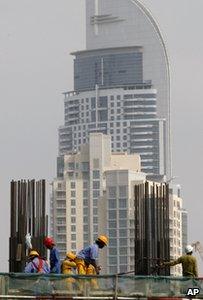
Banks around the world have lent billions to finance construction
In the United States, Lehman Brothers went bankrupt. In the UK, major names like Northern Rock, HBOS and RBS were all bailed out by the government.
And perhaps the most surprising thing about the credit crunch? Hardly any of the financial experts saw it coming.
A problem in one area of banking, high risk or "sub prime" mortgages in the United States, swept through the whole financial system, pushing up the cost of borrowing for everyone else.
Since then billions of pounds of taxpayers' cash have been spent propping up the banks and encouraging them to lend again.
The last thing those banks need now is another crisis.
Some worry that the problems in Dubai will send fresh jitters through the financial markets, prolonging the credit crunch and the recession for everyone - whether they are living in the Middle East or not.
Who paid for the skyscrapers?
The money to build all those towering skyscrapers had to come from somewhere.
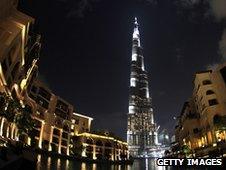
The Burj Dubai towers above everything else in the area
Banks from around the world, including Britain, have lent billions of pounds either to the kingdom of Dubai itself or the companies it controls.
At the last count the likes of HSBC, Barclays and RBS were owed around $50bn between them by the United Arab Emirates (of which Dubai is part).
There is no suggestion at the moment they won't get all of that cash back.
But if Dubai does start to default on its debts then it could be British banks and British investors that pay some of the price.
What Dubai owns
At the same time as our banks were investing in Dubai, state-owned companies from that part of the world were buying up some well known British brands.
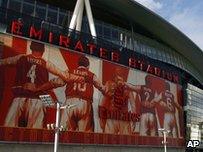
Dubai's national airline Emirates sponsors Arsenal football club
Alton Towers, Madame Tussauds, Scotland's Turnberry Golf Course, budget hotel chain Travelodge and the ferries group P&O are all owed by Dubai.
Arsenal football club and its new stadium are both sponsored by Dubai's national airline, Emirates.
British hotels, shopping centres and construction projects have all been financed by money from the Middle East.
If all that cash dries up it could force those Dubai investors to sell their British assets very quickly, possibly at a cut down price.
British workers' worry
Brits have flocked to Dubai over the last decade, attracted by sunshine, high wages and a tax-free lifestyle.
Around 50,000 British expats are thought to live in Dubai and the other UAE states, in jobs from construction and banking to teaching and bar work.
But the downturn in the economy means many foreign workers are being forced to sell up and return home.
The car park at Dubai airport is said to be full of thousands of vehicles abandoned as their owners left the country.
To make matters worse, many British workers bought houses or flats in the city when times were good and the economy was booming.
A collapse in prices means some could be left with properties worth thousands of pounds less than they paid for them.
Luxury tourism
Dubai's rich neighbours all have millions of barrels of oil hidden away under the sands.
Dubai has nothing; not one drop.
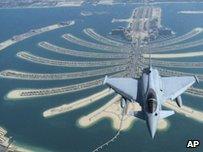
The Palm Jumeirah island is built in the shape of a palm tree
So to compete it set itself up as the service centre of the Middle East, specialising in sectors like retail and tourism.
Billions were spent on projects from an indoor ski resort in the desert to expensive man-made islands in the shape of the world.
Some of the sports stars and Hollywood celebrities said to have bought property include Michael Owen, David Beckham, Brad Pitt and Naomi Campbell.
They are now set to lose out. But for everyone else, the downturn in the economy could be better news as holiday firms cut the price of flights, hotel rooms and short winter breaks.
Longer term it could be a different story. The financial crisis could derail some of those grand plans to make the kingdom into the next big luxury destination.
- Published1 December 2009

- Published1 December 2009

- Published30 November 2009
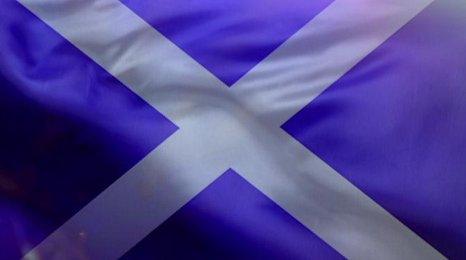
- Published26 November 2009
